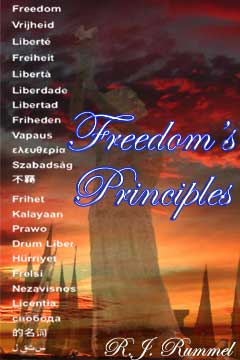[First published January 24, 2005] Enough time has gone by since president Bush’s inauguration speech that called for fostering democracy everywhere to appreciate the major media’s reaction, including commentators and foreign policy experts. One of the most frequently used characterizations is that the speech was idealistic: John F. Harris writes in The Washington Post: “The immediate question, presidential scholars and foreign policy experts say, is the same in Washington as it is in other capitals around the world: What to make of such idealistic and uncompromising language from an incumbent president? (link here) As used currently, “idealistic” is what one says about an idea while rolling one’s eyes skyward. It means, in effect, that one has a good heart, good intentions, but is naïve or simplistic about the real world.
A little history. After World War I, there was a concerted effort among the nations to create a lasting peace such that another world war like that would never happen again. The best way of doing this was thought to be through international organizations like the League of Nations that would serve as a forum for negotiation of international differences, act to prevent the escalation of conflict to violence, and even sanction aggression. Democracies also thought that an emphasis on international law, and especially disarmament treaties would also serve the peace. It all failed, profoundly, with the outbreak of the SinoJapanese war in 1937, and Germany’s invasion of Poland in 1939.
After World War II, nations created the United Nations in a way they believed avoided the mistakes of the League of Nations, and emphasized collective security. However, a new school of thought arose among students of international relations and specialists in foreign relations, which still dominates thinking today about national security and peace. And that is, peace is best assured by a balancing of power between actual and potential adversaries, and good diplomacy. This is called realpolitik. Practitioners of this art—called realists—emphasize real assessments of other nation’s capabilities and intentions, and what can be done in practical terms to improve the balance of power, and maintain stable international relations.
One of the fantastic applications of this was during the 1960s when the United States actually held back developing its nuclear capability, such as furthering the accuracy of its ICBMs, to let the Soviets catch up. Then, the idea was, we would have a balance of power (of terror), and better stability in Soviet-American relations. This was realism at work.
Now, the bete noir of the realist is the idealist. The idealist is a nice fellow, but unrealistic about the real world. The idealist has all these marvelous ideas and plans, these solutions to war, these beliefs about the natural good behavior of states, the belief in democracy, but you know, he hasn’t yet been mugged by reality.
Today, the major intellectual conflict is not between libertarians and Bushites, or what I will now call freedomists, on democracy and peace. The libertarians simply don’t count. Both realists and freedomists see them as irrelevant, a cult of isolationists. Nor are the leftists in the ring. They are seen as, you know . . . leftists. They will side with anyone they see as anti-American. The realists see the freedomist’s emphasis on democracy as unrealistic and dangerous, as creating an unstable world in which more war may be the outcome, and our national interests endangered. The freedomist see the realist as adhering to dogma that no longer applies to the new post-Cold War world, and that fostering freedom is the best way to protect the nation in the long run, and promote a peaceful world.
Most of the media people and commentators have been educated into realism—it is the dominant set of ideas in political science and international relations—and to be suspicious of any highflying proposals. They naturally see the call for ending tyranny as idealistic. Thus when you read that Bush is idealistic, understand that this is a complement with the back of the hand.
However, the most thorough research that any idea in international relations has ever received shows that the realistic one is Bush and his forward Strategy of Freedom, and that the realists if they have their way, will not free us for the historical cycle of war and peace. Realism, which has been practiced in Europe since 1648 and the creation of the modern state system and up until all Europe became democratic and unified, was in practice nothing but war by other means until the next round of war.
Realists much come to understand. The real realists are the so-called idealists, and the real idealists are the realists. You know, the realists have their heart in the right place, but . . . (eyes rolling skyward). In other words, get real.
Link of Note
”Debate on the ‘Democratic Peace’—A Review” (3/3/04) By Steven Geoffrey Gieseler
Introduction by AmericanDeplomacy.org: “Democracies do not make war on each other, and the more democratic, the less violent nations are in general.’ This theory of war avoidance is the subject of much peace literature published in recent years. The author provides an overview of the field and addresses the question of its continued validity in light of the war in Iraq.”
Gieseler’s conclusion is that, “There will always be honest and well-meaning scholars, indifferent moral relativists, and self-interested tyrants who will for different reasons dismiss the idea that democracy is inherently just and peaceful. Adherents to the ‘Democratic Peace’ in whatever future incarnation it might take must not give the floor, so to speak, but dictate the terms of the debate.”
So, this blog.








hah! And just when you thought it couldn’t get any crazier…